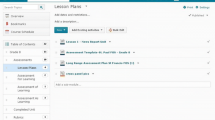Abstract
Successfully preparing prospective and practicing teachers to blog as a means of professional development requires more than simply introducing popular blogging platforms, teaching technical moves and assigning an arbitrary number of blog posts. To assist teacher educators who aim to engage teachers in sustained blogging to advance their professional growth, the author presents instructional methods drawn from scholarship on effective writing instruction, including the following: examining mentor texts in the form of teacher-generated blog posts; exploring writing territories (i.e., the topics, genres and audiences for whom a teacher could write); and pursuing specific purposes for writing to generate a number of focused blog posts from a single general topic of professional interest.

Similar content being viewed by others
References
Atwell, N. (2014). In the middle: A lifetime of learning about writing, reading, and adolescents (3rd ed.). Portsmouth: Heinemann.
Ciampa, K., & Gallagher, T. L. (2015). Blogging to enhance in-service teachers’ professional learning and development during collaborative inquiry. Educational Technology Research and Development, 63(6), 883–913.
Daniels, H., & Zemelman, S. (2014). Subjects matter: Exceeding standards through powerful content-area reading (2nd ed.). Portsmouth: Heinemann.
Fletcher, R. (2011). Mentor author, mentor texts: Short texts, craft notes, and practical classroom uses. Portsmouth: Heinemann.
Gallagher, K. (2011). Write like this: Teaching real-world writing through modeling and mentor texts. Portland: Stenhouse.
Hanuscin, D. L., Cheng, Y.-W., Rebello, C., Sinha, S., & Muslu, N. (2014). The affordances of blogging as a practice to support ninth-grade science teachers’ identity development as leaders. Journal of Teacher Education, 65(3), 207–222.
Hicks, T. (2013). Crafting digital writing: Composing texts across media and genres. Portsmouth: Heinemann.
Hicks, T., & Turner, K. H. (2013). No longer a luxury: digital literacy can’t wait. English Journal, 102(6), 58–65.
Hungerford-Kresser, H., Wiggins, J., & Amaro-Jiménez, C. (2011). Learning from our mistakes: what matters when incorporating blogging in the content area literacy classroom. Journal of Adolescent & Adult Literacy, 55(4), 326–335.
Kelley, B. (2015). Family history & culture [Blog post]. Retrieved from http://www.brianjkelley.net/2015/02/family-history-culture.html.
Kress, G. (2003). Literacy in the new media age. New York: Routledge.
Lieberman, A., & Pointer Mace, D. (2010). Making practice public: teacher learning in the 21st century. Journal of Teacher Education, 61(1/2), 77–88.
Loving, C. C., Schroeder, C., Kang, R., Shimek, C., & Herbert, B. (2007). Blogs: enhancing links in a professional learning community of science and mathematics teachers. Contemporary Issues in Technology and Teacher Education, 7(3), 178–198. Retrieved from http://www.citejournal.org/wp-content/uploads/2016/04/v7i3science1.pdf.
Luehmann, A. L. (2008). Using blogging in support of teacher professional identity development: a case study. The Journal of the Learning Sciences, 17, 287–337.
Luehmann, A. L., & Tinelli, L. (2008). Teacher professional identity development with social networking technologies: learning reform through blogging. Educational Media International, 45(4), 323–333.
Martindale, T., & Wiley, D. A. (2005). Using weblogs in scholarship and teaching. TechTrends, 49(2), 55–61.
Ray, B. B., & Coulter, G. A. (2008). Reflective practices among language arts teachers: the use of weblogs. Contemporary Issues in Technology and Teacher Education, 8(1), 6–26.
Ray, B. B., & Hocutt, M. M. (2006). Teacher-created, teacher-centered weblogs: perceptions and practices. Journal of Computing in Teacher Education, 23(1), 11–18.
Rodesiler, L., & Pace, B. G. (2015). English teachers’ online participation as professional development: a narrative study. English Education, 47(4), 347–378.
Shoffner, M. (2009). “Because I know how to use it”: integrating technology into preservice English teacher reflective practice. Contemporary Issues in Technology and Teacher Education, 9(4), 371–391. Retrieved from http://www.citejournal.org/wp-content/uploads/2016/04/v9i4languagearts1.pdf.
Wopereis, I. G. J. H., Sloep, P. B., & Poortman, S. H. (2010). Weblogs as instruments for reflection on action in teacher education. Interactive Learning Environments, 18(3), 245–261.
Author information
Authors and Affiliations
Corresponding author
Appendix
Appendix

Rights and permissions
About this article
Cite this article
Rodesiler, L. Sustained Blogging About Teaching: Instructional Methods that Support Online Participation as Professional Development. TechTrends 61, 349–354 (2017). https://doi.org/10.1007/s11528-017-0164-6
Published:
Issue Date:
DOI: https://doi.org/10.1007/s11528-017-0164-6




